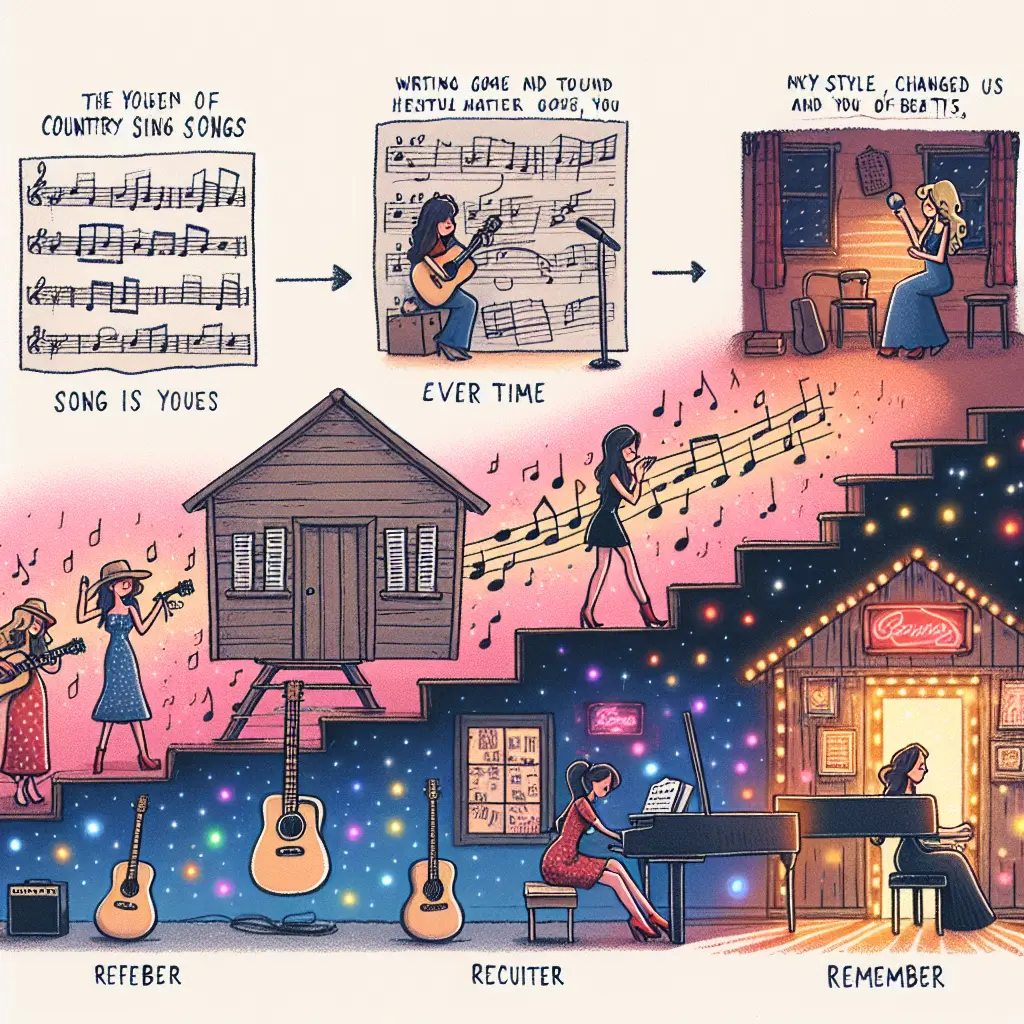
From her country roots to her pop domination and recent indie-folk reverberations, Taylor Swift has not just been a beacon of success but a testament to musical evolution. Over the years, her songwriting style has evolved dramatically, showcasing an artist who is not afraid to dive deep into new genres and complex lyrical themes. Today, let's embark on a detailed journey exploring the evolution of Taylor Swift's songwriting style, her career trajectory, and the thematic maturity that has come to define her music.
The Beginnings and Country Charm
Taylor Swift's career kicked off with a strong country influence in her self-titled debut album, "Taylor Swift," which featured narratives that resonated with teenage angst and innocence. Songs like "Tim McGraw" and "Teardrops on My Guitar" highlighted her ability to craft stories that felt both personal and universal, a hallmark of her songwriting style that fans quickly latched onto.
Transition to Pop and Mainstream Success
As her career progressed, so did her musical style. The album "Red" was pivotal, showcasing the beginnings of a genre shift to more mainstream pop. However, it was "1989" that cemented Taylor Swift's place in pop royalty. Hits like "Shake It Off" and "Blank Space" demonstrated a sharp departure from her country roots, leaning heavily into catchy hooks and synth-pop sounds. This era was not just about catchy tunes; it also marked a more introspective and self-aware phase of Swift's songwriting, reflecting on fame and media perception.
Deep Dives into Personal and Social Commentary
With "Reputation" and later albums, Taylor's lyrics grew in complexity, offering deeper introspection and broader social commentary. "Reputation," for instance, delved into themes of reputation management and personal scrutiny in the public eye, while "Lover" showcased a matured romantic perspective. Swift’s ability to blend personal experiences with broader cultural statements was becoming a more pronounced feature of her work.
Indie-Folk Reinvention
The surprise release of "Folklore" in 2020 marked another significant turn in Taylor Swift’s musical journey. Embracing indie-folk sounds, the album's narrative-driven songs like "Cardigan" and "Betty" were a departure from her pop sound, offering listeners vivid storytelling and emotional depth. This album, followed by "Evermore," solidified Swift's versatility and commitment to storytelling, regardless of genre constraints.
Recent Challenges and Triumphs
Taylor Swift’s recent years have not been without challenges. News surfaced that a teen was allegedly planning a terrorist attack at one of her concerts, highlighting the darker side of fame (source needed). Additionally, Swift’s concerts in Vienna were canceled over similar fears, leaving fans, including one who flew over 15 hours, devastated (source needed). Despite these hurdles, Swift continues to impact her fans profoundly and positively.
Swift's influence extends beyond music. Recently, she subtly revealed being the godmother to Ryan Reynolds and Blake Lively’s children while praising the new 'Deadpool' movie (source needed). Moreover, an Instagram photo sparked rumors of her political leanings, showing the multifaceted nature of her public persona (source needed).
Driving Forces in Modern Music Industry
Amidst evolving as an artist, Taylor Swift also navigates the changing landscapes of the music industry. The rise of streaming platforms like Spotify encourages artists to favor quantity over quality—a trend Swift has cleverly managed by maintaining high-quality releases while also keeping up with industry demands (source needed).
Analysis of Lyrical Themes and Musical Growth
Throughout her albums, Taylor Swift's lyrical themes have also shown significant growth. From dealing with personal heartbreak and public scrutiny to exploring complex relationships and self-identity, her lyrics offer a window into her evolution as an individual. The authenticity in her songwriting connects deeply with audiences worldwide, making her music both relatable and cathartic.
Conclusion
Tracing the evolution of Taylor Swift from a country singer-songwriter to a global pop icon reveals more than just changes in musical style. It shows an artist who grows with her audience, who challenges herself with each new project, and who uses her platform to discuss broader social issues while staying true to her narrative-driven songwriting roots.
As we look forward to what new boundaries Taylor will push in her future works, one thing remains clear: her journey is a dynamic tapestry woven with resilience, adaptability, and sheer creative force. Whether you're a long-time Swiftie or a casual listener, there's no denying the impact Taylor Swift has had on music and beyond.
Thank you for joining me on this exploration of Taylor Swift's musical journey. May her songs continue to inspire and resonate with us all.
Yours in music,
Natalie Foster